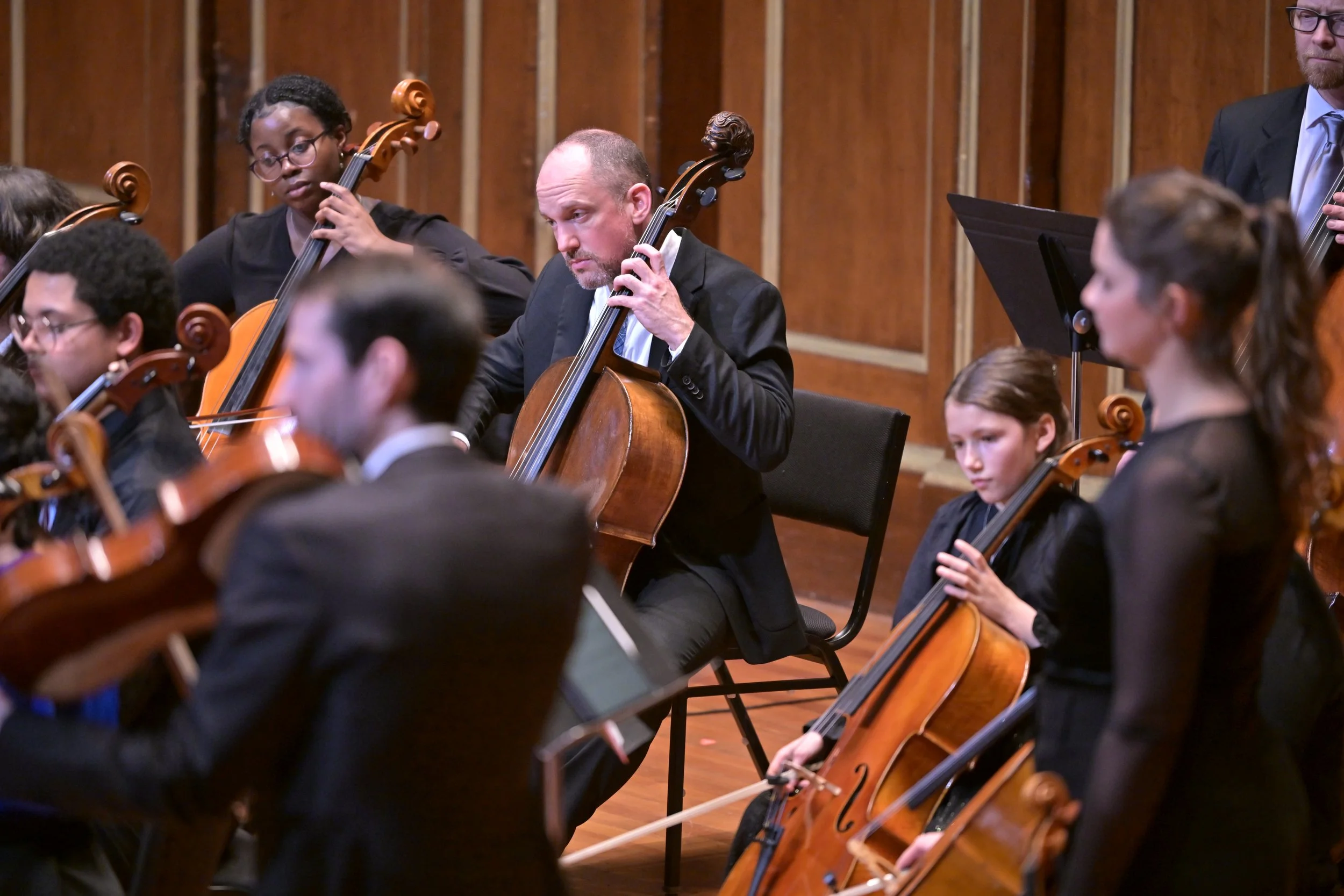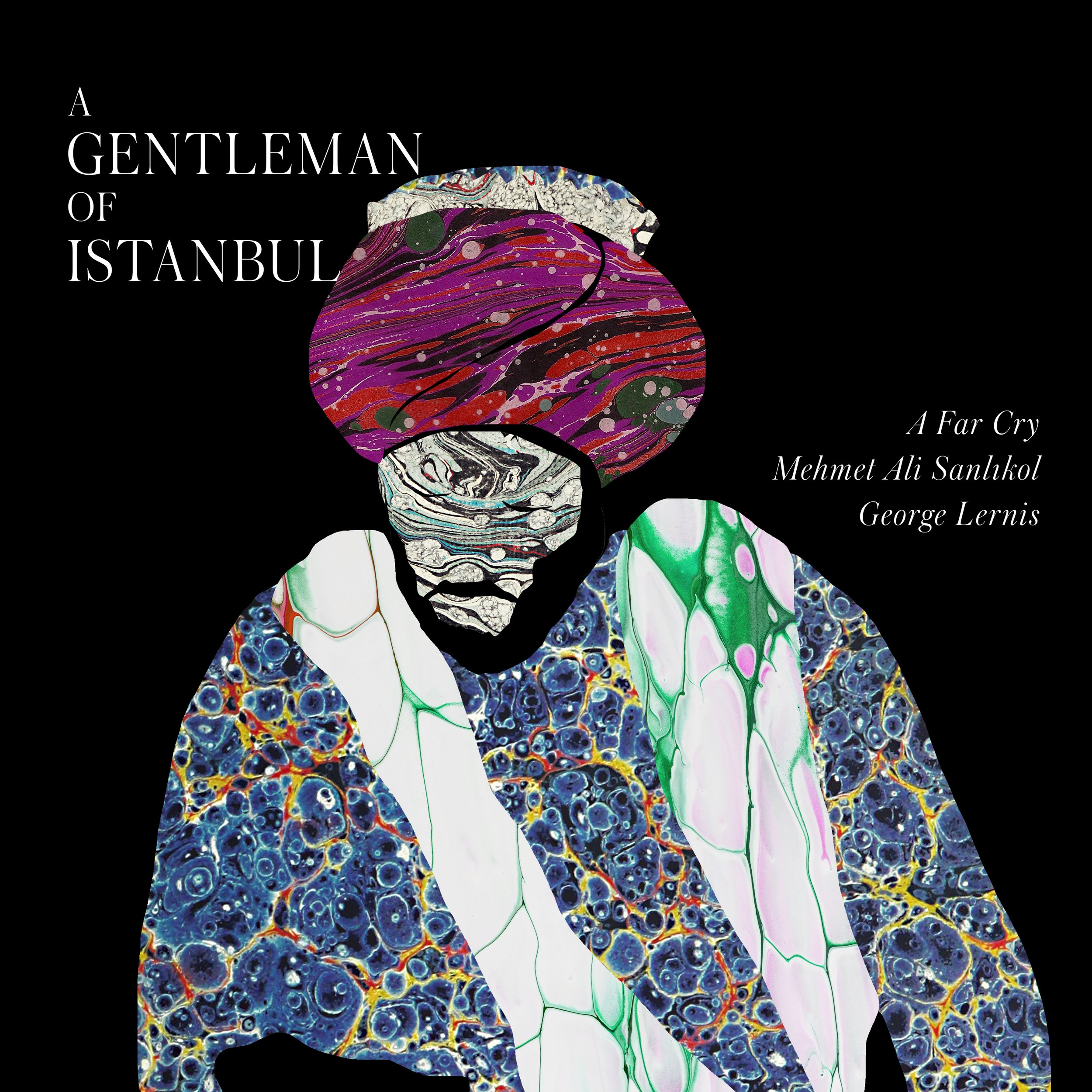For Seasons is more than a concert—it’s a meditation on what we’ve inherited and what we risk losing. Through imaginative programming and visceral performance, A Far Cry offers audiences not just beauty and power, but also a moment to pause, reflect, and reimagine a more sustainable world.
Beethoven’s Pastorale, Reimagined: A Far Cry’s Bold Take on a Classic
CODED: Rehearsal Week Reflections
Unveiling CODED: Davóne Tines, Harry Burleigh, and the Legacy of Spirituals in American Music
On October 11th & 13th, A Far Cry presents CODED, a concert that explores the profound legacy of Black spirituals and their ongoing survival through “code-switching” in music. Featuring world-renowned bass-baritone Davóne Tines, CODED will be a journey through time, culture, and identity, with a program that includes works by Harry Burleigh, Antonín Dvořák, Frederick Tillis, and Tyshawn Sorey.
In addition to showcasing the evolution of spirituals, this concert also highlights the historic relationship between Burleigh and Dvořák, whose partnership helped solidify spirituals as one of America’s most significant musical forms.
Davóne Tines: A Voice for the Ages
Davóne Tines. Photo credit: Bowie Verschuuren
Davóne Tines is one of today’s most celebrated vocalists, known for his extraordinary ability to bring deep emotional resonance to every performance. Tines has made it his mission to elevate the Black spiritual as a vital part of the classical canon. His collaborations with ensembles like A Far Cry shine a spotlight on how spirituals have evolved while still retaining their roots in African American history and experience.
In CODED, Tines will perform alongside A Far Cry in a program that not only revisits timeless spirituals but also offers fresh perspectives, including the world premiere arrangement of Songs of Death for bass-baritone and string orchestra, written by Pulitzer Prize-winning composer Tyshawn Sorey. This work for promises to be a moving meditation on loss, memory, and the ways in which spirituals continue to evolve in contemporary music.
Harry Burleigh: The Father of Spiritual Arrangements
At the heart of CODED is the legacy of Harry T. Burleigh, a groundbreaking African American composer and arranger whose work was instrumental in bringing Black spirituals into the mainstream of American classical music. Born in 1866, Burleigh made his mark by arranging traditional spirituals for concert performance.
Burleigh’s influence on American music cannot be overstated. His arrangements of spirituals, such as Deep River and Swing Low, Sweet Chariot, not only preserved these important songs but also elevated them, showcasing their emotional depth and musical complexity. By blending the raw, emotional power of the spiritual with the formal structures of classical music, Burleigh created a new space for these songs within the broader American musical landscape.
The Dvořák-Burleigh Connection: A Historic Collaboration
One of the more interesting aspects of Harry Burleigh’s career is his relationship with celebrated Czech composer, Antonín Dvořák. In 1892, Dvořák became the director of the National Conservatory of Music in New York City, where Burleigh was a student. The two formed a close relationship, and Burleigh frequently sang spirituals for Dvořák, introducing him to the rich musical heritage of African American spirituals.
Dvořák was deeply moved by the beauty of these songs, and they had a profound influence on his work—most notably his Symphony No. 9 in E Minor, Op. 95, better known as the New World Symphony. In this piece, Dvořák incorporated elements of spirituals, creating a symphony that reflected the diverse musical heritage of the United States.
In a letter, Dvořák famously wrote, “In the Negro melodies of America, I discover all that is needed for a great and noble school of music.” This belief—that the spiritual was a uniquely American form of music that could help shape the nation’s musical identity—was largely inspired by Burleigh’s influence.
CODED: A New Chapter in the Legacy of Spirituals
A Far Cry’s CODED continues the conversation Burleigh and Dvořák began over a century ago. Through performances of spirituals and works that explore their evolution, the concert delves into the complex history of these songs and their role in American music. From Burleigh’s pioneering arrangements to Dvořák’s “American” Quartet (which will be performed in an arrangement for string orchestra by A Far Cry’s own Sarah Darling), the concert highlights how spirituals have shaped—and continue to shape—our cultural and musical landscape.
The program also includes Frederick Tillis’ Spiritual Fantasy No. 12, II. Wade in the Water, another profound reimagining of a classic spiritual, arranged by Crier Francesca McNeeley, and three new string orchestra arrangements of spirituals by Crier Alex Fortes. These works, together with Burleigh’s legacy, form a powerful exploration of how spirituals have survived and thrived through the centuries, constantly adapting to new contexts while retaining their deep connection to African American history.
Join Us for CODED on October 11th & 13th
CODED is not just a concert; it’s a reflection on the power of music to carry history, culture, and emotion across generations. Join A Far Cry and Davóne Tines at NEC’s Jordan Hall on Friday, Oct. 11 at 7:30pm, and Connecticut College’s Evan’s Hall on Sunday, Oct. 13 at 3:00pm, for this unforgettable concert event, and experience firsthand how spirituals continue to resonate today.
Event Details:
📅 Date: Friday, October 11 & Sunday, October 13, 2024
🕣 Time: 7:30 PM & 3:00pm
📍 Location: NEC's Jordan Hall, 30 Gainsborough Street, Boston, MA; 270 Mohegan Avenue Parkway, New London, CT
🎟️ Tickets: Available HERE
Witness a musical journey that connects the past with the present and celebrates the enduring legacy of Black spirituals in American music.
SAVE THE DATES FOR SEASON 18
We're keeping most of the season details under wraps until the Spring Soiree on June 12th (tickets on-sale now!), but in order to help folks plan, save the following dates for our 2024-2025 Subscription Series!
St. John's Episcopal Church (1 Roanoke Ave., Jamaica Plain 02130)
Saturday, September 21, 2024 @ 3:00PM (NEW TIME!)
Saturday, December 14, 2024 @ 3:00PM
Saturday, March 1, 2025 @ 3:00PM
Saturday, April 12 @ 3:00PM
NEC's Jordan Hall (30 Gainsborough St., Boston 02115)
Friday, October 11, 2024 @ 7:30PM (NEW TIME!)
Friday, November 8, 2024 @ 7:30PM
Friday, January 31, 2025 @ 7:30PM
Saturday, March 29, 2025 @ 7:30PM
Friday, May 6, 2025 @ 7:30PM
Join us at the Soiree to find out all the repertoire, guest artists, and new venues slated for next season and in the meantime, save the dates!
Announcing our Summer Tour Dates!
Announcing the Host of Stradivari Serenade
We're thrilled to announce that Terrance McKnight will host Stradivari Serenade on March 29th!
Radio host, commentator, curator, writer, and pianist, Terrance McKnight serves humanity and music by “bringing everyone’s culture to the table, by not putting one above the other, but rather by ensuring a big enough table with a place for all.”
WQXR listeners may recall Terrance hosting the broadcast of our concert last summer at Central Park's Naumburg Bandshell. Read Terrance’s bio below, and get your tickets for next week's Stradivari Serenade!
Terrance is the author of the upcoming book “Concert Black,” anticipating a 2024 release by Abrams Press. McKnight is the weekday evening host for WQXR, New York’s only all-classical music station. In early 2023 in association with the station, his production company, Concert Black LLC, launched a podcast series. The first topic, representations of Blackness in opera, was captured in 16 weekly
episodes and distilled into 4-one hour radio documentaries.
Prior audio documentaries he has authored, voiced and produced for WQXR feature Langston Hughes, Dr. Martin Luther King, Jr., Hazel Scott, Coleridge-Taylor Perkinson, Florence Beatrice Price, Leonard Bernstein and Harry Belafonte. Another of his radio shows for WQXR, All Ears with Terrance McKnight, a series about musical discovery, was honored with an ASCAP Deems Taylor Radio Broadcast Award.
In June 2023, Terrance, Ron Carter, Clive Davis and the Reverend Al Sharpton were speakers at a New York City-based celebration of Harry Belafonte. Also in 2022-23, he hosted diverse offerings in music from the Han and Heung Festival exploring the stories and traditions of Korea at Louisiana State University, to the New York premiere of Laura Kaminsky’s chamber opera “Hometown to the World” at historic Town Hall, to facilitating a conversation around the Black Lives Matter movement and the creation of the first community-based mural in the Brooklyn neighborhood during the summer of 2020 in Bedford-Stuyvesant and lent his voice as narrator for performances of Peter & the Wolf.
In his latest creative offering, Langston & Beethoven: Black & Proud, McKnight gives voice to the poetry of Hughes paired with chamber music works of Beethoven, Gershwin and others, combined with storytelling, narrating vignettes from his childhood and current events. The show was a February 2023 presentation at Lincoln Center’s Sidewalk Studio.
Terrance has hosted concerts for Atlanta Symphony Orchestra, The Orchestra of St. Luke’s,
Philadelphia Orchestra, New York Philharmonic’s Young People’s Concerts, the American Pianists
Association Competition, gave the keynote address for the diversity track of the 2022 Music Teachers National Association conference and participated in journalism symposium for the Bang on a Can Summer Festival, also in 2022. His is the voice of recent media campaigns for Carnegie Hall and the Studio Museum in Harlem. In association with the exhibition Charles White: A Retrospective at Museum of Modern Arts, Terrance curated a series of concerts and audio tours in 2019.
McKnight is a member of the Artistic Council, with Claire Chase and conductor Robert Spano, for The Hermitage Artist Retreat in Florida, serves on the board of MacDowell and is the Artistic Advisor for the Harlem Chamber Players. He has participated on panels for Chamber Music America, the Mellon Foundation, American Opera Projects, the Schomburg Center for Research in Black Culture, ASCAP and the New York State Council on the Arts. It is Terrance McKnight’s commentary that introduces the liner notes for the recent recording of Three Ife Songs by Phillip Glass, featuring singer Angelique Kidjo, Dennis Russell Davies and the Bruckner Orchestra Linz.
Curator Corner: What’s the meaning of Stonehenge?
I’m a fan of the gods of mischief, the traits of Gentle Guardian and Troublemaker being a particularly potent combination, held by many of my dearest people.
AFC’s Stonehenge is perhaps an attempt to channel that kind of spirit: not at all a serious program of serious music (at least not at face value), but more of a tap on your opposite shoulder, and hopefully one that draws your attention to something out there, maybe something simpler, and maybe also bigger.
The pieces of Stonehenge fit together a bit like a crude collage: that fifth grade art project where your teacher dropped a pile of magazines on the table and asked you to cut and paste images that, together, evoked something.
Here, first, there’s a representation of a sunrise: Icelandic composer Anna Thorvaldsdottir’s Illumine; the piece is steely, cool, and arresting; the sunrise of a sun that always hangs close to the horizon. Next, is the monument of stone: Paul Wiancko’s Vox Petra (“the voice of the rock”); not a depiction of Stonehenge, but of the abstract basalt monoliths of renowned artist and sculptor Isamu Noguchi. Then the program ends with a paean to the countryside: Beethoven’s “Pastoral” Symphony, arranged for string sextet, a version Beethoven may well have known and even played on viola, created by his contemporary Michael Fischer.
Together, the sunrise, the stone, and the landscape = a stonehenge.
Other traits in common: the music is awe-inspiring, all three pieces employing effects conjure goosebumps, and whose majestic power can elicit eye-misties. They are also all reverential, each pointing to something else that is beautiful.
I have some first hand experience of this with Paul Wiancko’s Vox Petra, as I was fortunate enough to assist in a video recording of it during my time working for Five Boroughs Music Festival in New York City. Vox Petra is a name shared by Paul Wiancko’s piece and an Isamu Noguchi sculpture, and Astoria, Queens is home to the Noguchi Museum, a converted warehouse that Noguchi himself designed to house his own artworks and the artworks of others. We recorded Vox Petra with members of the Argus Quartet and Paul himself, playing Cello 2, in a covered outdoor pavilion that houses Noguchi’s basalt giants. It was a chilly April day, chirping birds, gusts of wind, and passing cars providing both atmosphere and the occasional disruption. But we were all kids in a candy store, and nobody wanted to pass up the chance to record this piece with this backdrop. At one point, Paul walked us over to one of the sculptures and showed us how the progressive changes in texture that Noguchi’s sculptures employ served as a sort of form diagram for the piece: when the sculpture was smooth, so was the music, as when the sculpture was jagged, etc.
It was also April of 2021. We were in the process of receiving our first COVID vaccines, and digital concerts were still largely taking the place of live events. The Noguchi Museum was also operating at a heavily reduced capacity, which meant that we were able to have free run of the place (with two museum curators) for a full day and a half; a true silver lining moment of the pandemic.
Vox Petra ends with the most gentle and playful of touches: asking the players to use their bows as hammers and chisels, gently tapping on their instruments’ tailpieces, then to swipe the string gently crosswise, creating the sound of sweeping up dust. It brought the sounds of Noguchi’s one-time studio back to the now-museum, sweetly conjuring up old ghosts. I doubt any of us had ever been shattered so gently or felt so close to an artist we never knew.
Watch the performance of Vox Petra above. The video opens with an extended walk-through of the Noguchi Museum, and Paul Wiancko’s piece begins at 36:41]
3 Albums, 3 Grammy Nominations
We're celebrating THREE Grammy nominations! Each of the three eligible albums A Far Cry worked on have received nominations for the 2024 GRAMMY’s and we couldn’t be more thrilled to have each one recognized in some way!
And in case you weren’t aware, you can hear Jessie Montgomery’s “Rounds”, 2024 Grammy nominee for Best Contemporary Composition, performed by AFC and Awadagin Pratt alongside works by Paola Prestini, Alvin Singleton, and Beethoven LIVE this Friday, November 17 at 8PM at Four Quartets!
For Your GRAMMY® Consideration
It’s GRAMMY® FYC season and we’ve been BUSY!
A Far Cry has THREE albums eligible in multiple categories! Click the images below to listen to each album now!
New Amsterdam and Nonesuch Records released The Blue Hour, a song cycle written collaboratively by the female composers Rachel Grimes, Angélica Negrón, Shara Nova , Caroline Shaw, and Sarah Kirkland Snider; featuring excerpts from Carolyn Forché’s epic poem On Earth.
Released October 2022 The Blue Hour is eligible in the following categories:
> Best Contemporary Classical Composition
> Best Classical Solo Vocal Album
> Best Engineered (Classical)
> Producer of the Year (Classical)
——————————————
Vocals: Shara Nova
Additional vocals: members of A Far Cry, Rachel Grimes, Angélica Negrón, Shara Nova, Sarah Kirkland Snider
Strings: A Far Cry
Sound design: Michael Hammond, with Rachel Grimes, Angélica Negrón, Shara Nova, Caroline Shaw, Sarah Kirkland Snider
Produced by Rachel Grimes and Shara Nova
Artistic Production team: Rachel Grimes, Angélica Negrón, Shara Nova, Caroline Shaw, Sarah Kirkland Snider, Andrew Scheps, Alex Fortes, and Jesse Lewis
Mixed by Andrew Scheps, Tonequake
Mastering by Helge Sten, Sten Audio Virus Lab
Strings recorded at Futura Productions, Roslindale, MA
Chief Recording Engineer and String Producer for A Far Cry: Jesse Lewis, Immersive Music Project
Recording and editing engineer: Kyle Pyke
Additional string editing: Shauna Barravecchio, Christopher Moretti, Karl Doty
Chief Recording Engineer for Futura: John Weston
Assistant Engineers for Futura: Travis Karpak, Jacob Steingart
Lead Vocal Engineer: Patrick Dillett at Reservoir Studios, New York City
Assistant Engineer: James Yost
Second Engineer: Peter Jensen
Additional vocal engineering: Shara Nova at Blue Sword Studios, Detroit
Lead vocal editor: Casey Foubert
Vocal pre-production mixing: Mitchell Graham
Album design & layout: DM Stith
A Gentleman of Istanbul: Symphony for Strings, Percussion, Piano, Oud, Ney & Tenor featuring Mehmet Ali Sanlıkol and George Lernis was recorded at Futura Productions back in June 2021 and released April 2023 on Crier Records. It is eligible in the following categories:
> Best Chamber Music/Small Ensemble Performance
> Best Contemporary Classical Composition
“A Gentleman of Istanbul is an exceptional work — deeply moving, authentically multicultural, and instantly re-listenable. A Far Cry and Sanlıkol have nailed it with this collaboration ...” – San Francisco Classical Voice
——————————————
A Far Cry, strings
George Lernis, percussion
Jesse Lewis, producer
Christopher Moretti and John Weston, recording engineers
Travis Karpak and Jacob Steingart, assistant engineers
Christopher Moretti, mixing engineer
Jesse Lewis and Shauna Barravecchio mastering engineers
Album cover collage design by DM Stith
Studio footage filmed by Dan Schwartz
Animation by Jeff Claassen
Video edited and directed by Mehmet Ali Sanlıkol
Awadagin Pratt’s STILLPOINT was released August 2023 via New Amsterdam and features six newly-commissioned works by Alvin Singleton, Jessie Montgomery, Judd Greenstein, Paola Prestini, Pēteris Vasks, Tyshawn Sorey; performed by Pratt, A Far Cry, and vocal ensemble Roomful of Teeth.
STILLPOINT is eligible in the following categories:
> Best Classical Instrumental Solo
> Best Contemporary Classical Composition
> Best Album Notes
> Best Engineered (Classical)
Executive Producer: Mark Rabideau
Producers: Mark Rabideau, Judd Greenstein, Jesse Lewis
Recording Engineer: Francisco Gonzalez Navarro
Engineering Assistant: Christopher Moretti
Editing Engineers: Christopher Moretti, Shauna Barravecchio
Mixing Engineer: Jesse Lewis
Mastering Engineers: Christopher Moretti, Shauna Barravecchio
Piano: Awadagin Pratt
Composers: Alvin Singleton, Jessie Montgomery, Judd Greenstein, Paola Prestini, Pēteris Vasks, Tyshawn Sorey
Sponsors: ArtsWave Cincinnati, Art of the Piano Foundation, Yamaha
License agreement for use of T.S. Eliot poetry: Faber & Faber Limited
Vocals: Roomful of Teeth
Strings: A Far Cry


















